Jesus is risen
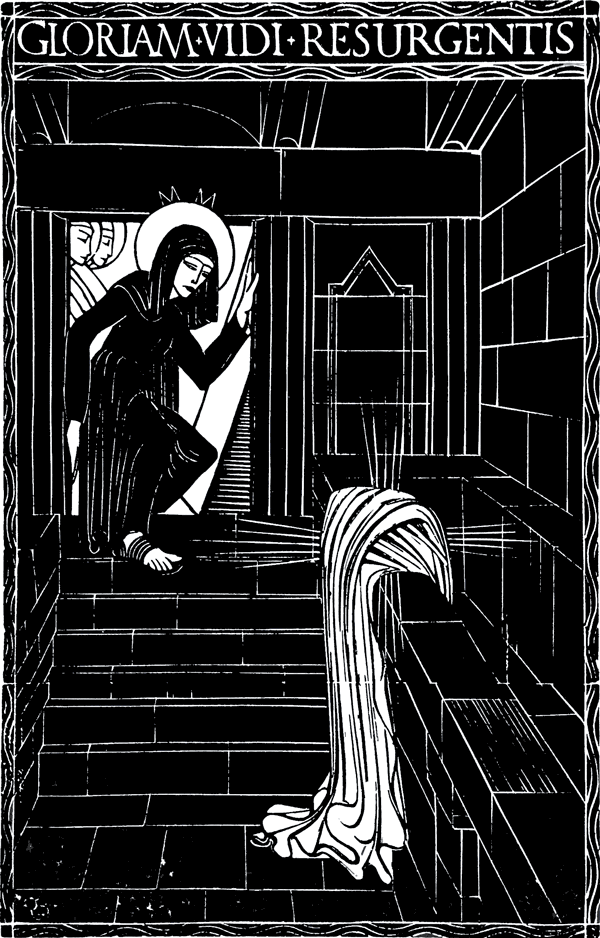
Mary Magdalene
“That Saturday was such a long day. From sunset after we had buried him, we could do nothing. We went home and locked ourselves in and cried. Oh, how we cried. His poor mother could not be comforted, and the rest of us were no better. We had loved him so much, and known his even greater love in return. He’d inspired us and taught us and given us hope. And then, so suddenly, he was dead. Still, we were determined to do what we could to give him a decent burial, so as soon as it was getting light on that Sunday morning, we were up and dressed. We rushed out with our oils and spices and off to the hillside. But when we got there we were in for a shock. The grave had been opened. We hadn’t expected that and we were very frightened. But we couldn’t have begun to imagine what had really happened. No one was going to believe us, a group of poor women from Galilee. Was it really possible that he was alive?”
Prayer
Lord Jesus, you were dead but now you are alive:
transform the torments of this world’s sin
that we may see your radiant glory.
You were raised from death to life:
may the power of your resurrection live in us,
that we may be channels of your true life beyond measure.
To you, Jesus, who have broken free from the bonds of death,
be honour and glory with the Father and the Holy Spirit,
now and for ever.
Amen.
illustration: from a wood-engraving by Eric Gill, 1917
2 CommentsJesus is placed in the tomb
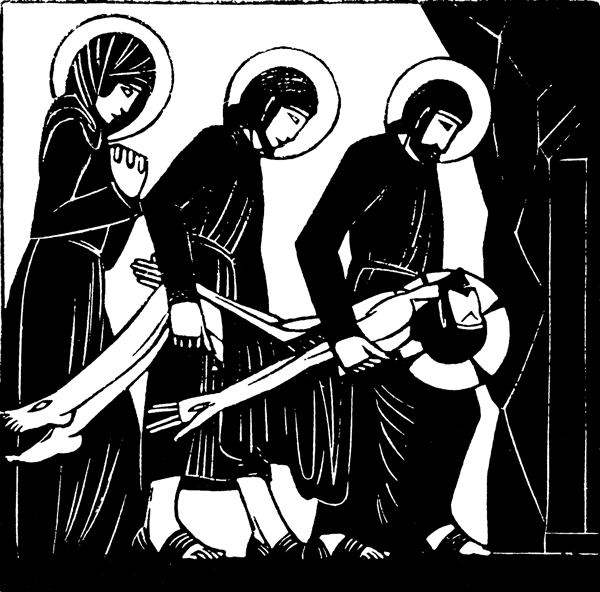
Joseph of Arimathea
“I’m Joseph of Arimathea. Like Nicodemus, I was a member of the Jewish Council. I’d only recently had a new tomb cut from the rock, near to the place. It was to be for me and my family. But it was beginning to get dark, and we had to bury his body before sunset. So I suggested laying him out there, and then we could come back on Sunday morning to tidy things up and anoint his body and say our prayers. That’s what we did, and the Governor ordered the tomb to be sealed and guarded. Of course, on Sunday morning it was all very different …”
Prayer
Lord Jesus, Lord of life, you became as nothing for us:
be with those who feel worthless and as nothing in the world’s eyes.
You were laid in a cold, dark tomb and hidden from sight:
be with all who suffer and die in secret,
hidden from the eyes of the world.
To you, Jesus, your rigid body imprisoned in a tomb,
be honour and glory with the Father and the Holy Spirit,
now and for ever.
Amen.
illustration: from a wood-engraving by Eric Gill, 1917
0 CommentsJesus is taken down from the cross
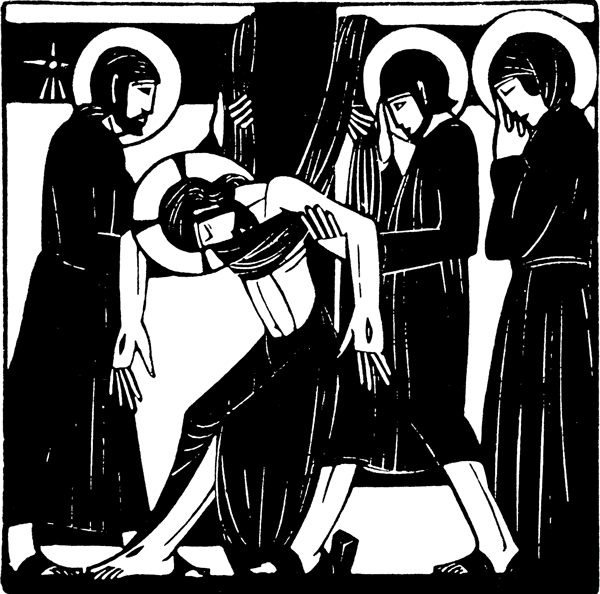
Nicodemus
“I’m Nicodemus. I had met him a few times and spoken to him. Now he was dead. We thought it was all over. All we could do now for him was to get him down from that cross and give him some dignity in death. My friend, Joseph, and I went to his mother to offer our help. I think Joseph went to see the Governor and got his permission. So we were able to get him down and cover him up. It was a terrible task, but it was the last thing we could do for him. It was awful to see his mother holding his limp body and kissing his bloodied face. And we just kept asking ourselves, Why; why did this happen?”
Prayer
Lord Jesus, your friends and family mourned at your death:
give strength and comfort to those who mourn.
To you, Jesus, your body cradled by your mother in death as in birth,
be honour and glory with the Father and the Holy Spirit,
now and for ever.
Amen.
illustration: from a wood-engraving by Eric Gill, 1917
0 CommentsJesus dies on the cross
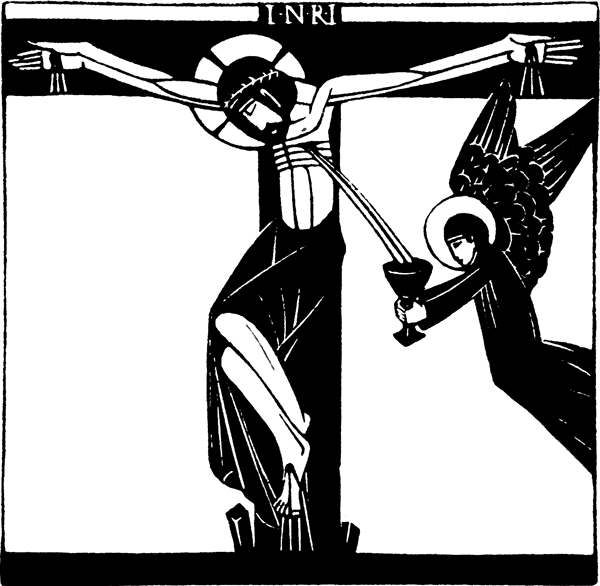
the Centurion
“I was the Centurion. My job was to supervise the whole execution and see it through until the three men were dead, and keep the crowds under control too. As the occupying power in a troubled territory we were used to executing rebels. But I remember this one. Of course it was at Passover, and the crowds were large and worrying. The Governor had us put a sign over him — that he was king of the Jews, and this is how any king of the Jews would end up. And it went so dark that day, you’d think it was the middle of the night. But the way he died was different too. He didn’t curse, he didn’t incite his friends to rebellion, he seemed to be saying his prayers and talking to his mother and a few friends. Through all the pain, through all the indignity and humiliation, he seemed to know what he was doing. Everything about him proclaimed his innocence.”
Prayer
Lord Jesus, you died on the cross
and entered the bleakest of all circumstances:
give courage to those who die at the hands of others.
In death you entered into the darkest place of all:
illumine our darkness with your glorious presence.
To you, Jesus, your lifeless body hanging on the tree of shame,
be honour and glory with the Father and the Holy Spirit,
now and for ever.
Amen.
illustration: from a wood-engraving by Eric Gill, 1917
1 CommentJesus is nailed to the cross
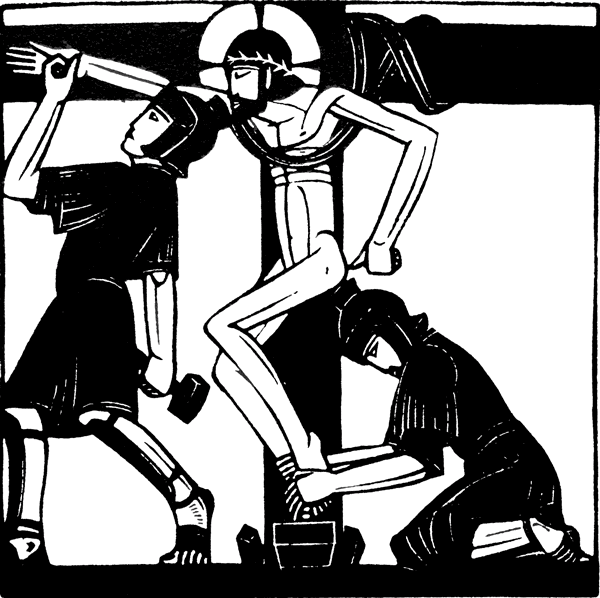
a soldier
“The next thing was to nail him to his cross. Sometimes prisoners were tied up, other times we used nails. This time it was nails. It always took a whole squad of us to do this. Some to hold the cross secure, some to hold him and restrain him, then someone to hold the nail, and someone to hold the hammer. You had to put a nail through each wrist, so he would be held up by the nail between the two forearm bones. Then a single nail through both ankles. To breathe, a man would have to push himself up on these nails through his wrists and ankles.”
Prayer
Lord Jesus, you bled in pain as the nails were driven into your flesh:
transform through the mystery of your love the pain of those who suffer.
To you, Jesus, our crucified Lord,
be honour and glory with the Father and the Holy Spirit,
now and for ever.
Amen.
illustration: from a wood-engraving by Eric Gill, 1917
0 CommentsJesus is stripped of his garments
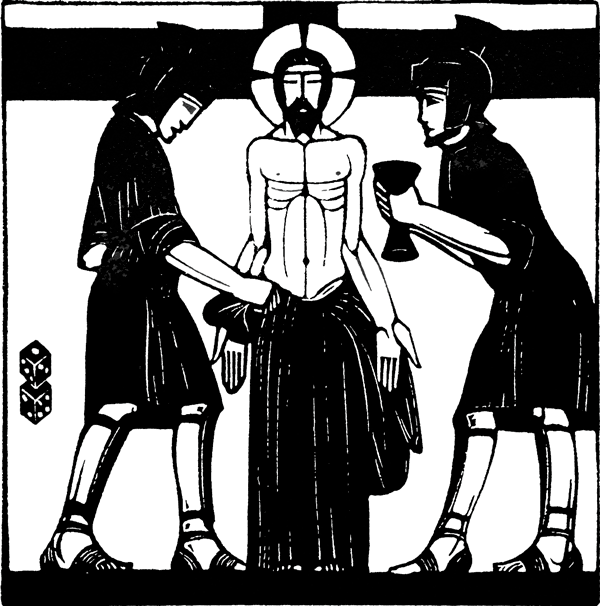
a soldier
“I was a soldier in the guard. We were just doing our job, something we’d done dozens if not hundreds of times before. Crucifixion was our business. First thing was to strip the prisoner. No dignity was left to a man being executed, not even a cover for his nakedness. His tunic was woven all in one piece, I remember that, and we threw dice to see who would have it.”
Prayer
Lord Jesus, stripped and beaten by your captors:
be with all who are deprived of their dignity
by the actions of their fellow human beings.
Your clothes were given over to a game of chance:
inspire us to protect the weak and innocent, and give dignity to all.
To you, Jesus, the Word made Flesh,
be honour and glory with the Father and the Holy Spirit,
now and for ever.
Amen.
illustration: from a wood-engraving by Eric Gill, 1917
0 CommentsJesus falls the third time
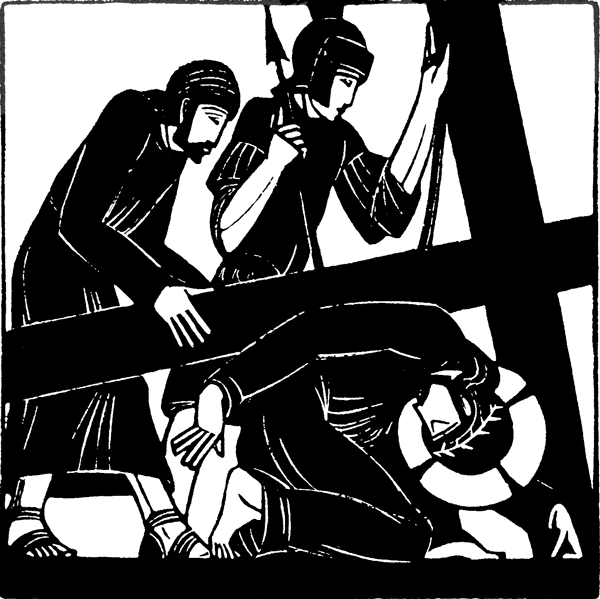
another woman
“After he’d fallen before, we’d run along the road, pushing through the crowd, through the city gate to the hill outside the walls. And just as we got there, he fell again, a third time. How much longer can this go on? And this time the soldiers don’t even try to force him to his feet. They’re already at the place.”
Prayer
Lord Jesus, three times you prayed that this cup might be taken from you
and three times you fell under the weight of the cross:
hear our pleading, our cries of agony.
Three times Peter disowned you
and three times you bade him feed your sheep:
forgive us when we disown you and strengthen us to share your love.
To you, Jesus, sharer in our suffering,
be honour and glory with the Father and the Holy Spirit,
now and for ever.
Amen.
illustration: from a wood-engraving by Eric Gill, 1917
0 CommentsJesus speaks to the women of Jerusalem
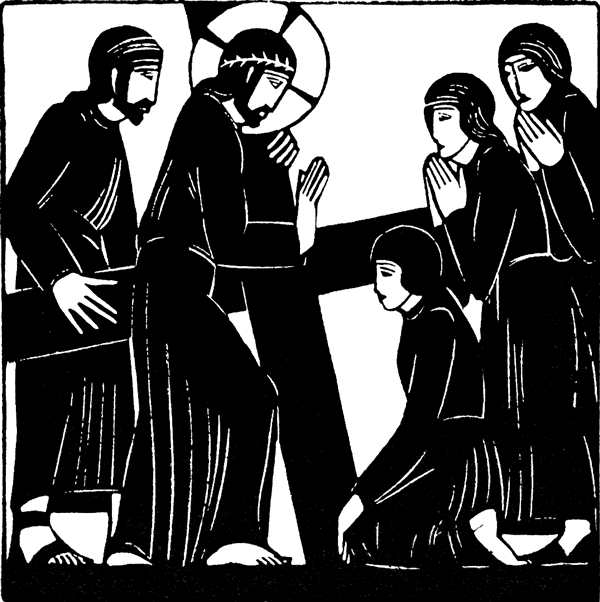
a woman
“My friends and I had been waiting for him to come to Jerusalem. We’d heard about the man from Galilee. We’d even seen him there and heard him speak. And now here he was. Surely it didn’t have to come to this? And as we cried he must have heard us, and drew on his reserves. ‘Don’t cry for me,’ he said, ‘cry for yourselves and your children’. How could he have known what would happen to us all these years later? Our beautiful city destroyed, and our Temple razed to the ground. Now there are no more sacrifices here.”
Prayer
Lord Jesus, the women of Jerusalem wept for you:
move us to tears at the plight of the broken in our world.
You embraced the pain of Jerusalem, the ‘city of peace’:
bless Jerusalem this day and lead it to the path of profound peace.
To you, Jesus, the King of peace who wept for the city of peace,
be honour and glory with the Father and the Holy Spirit,
now and for ever.
Amen.
illustration: from a wood-engraving by Eric Gill, 1917
1 CommentJesus falls the second time
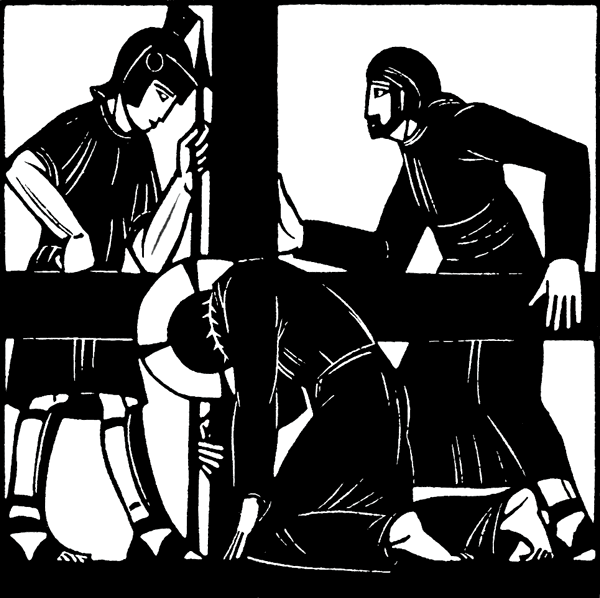
a man
“We were walking into the city as the soldiers cleared the way out, so we stood to one side to watch. A man, helped by another man, was carrying his cross. Even with help he was struggling, and he stumbled and fell beneath the weight. Some of the crowd were yelling abuse at him, and others were crying. Despite everything there was something about him that stood out. I remember wondering who he was.”
Prayer
Lord Jesus, you suffered and fell under the ill-treatment of your captors:
be with all who cannot find the strength to get up and carry on.
Your captors were doing the job they had been given:
guard us from causing others to stumble and fall.
To you, Jesus, bearing the cross for the whole world,
be honour and glory with the Father and the Holy Spirit,
now and for ever.
Amen.
illustration: from a wood-engraving by Eric Gill, 1917
0 CommentsVeronica wipes the face of Jesus
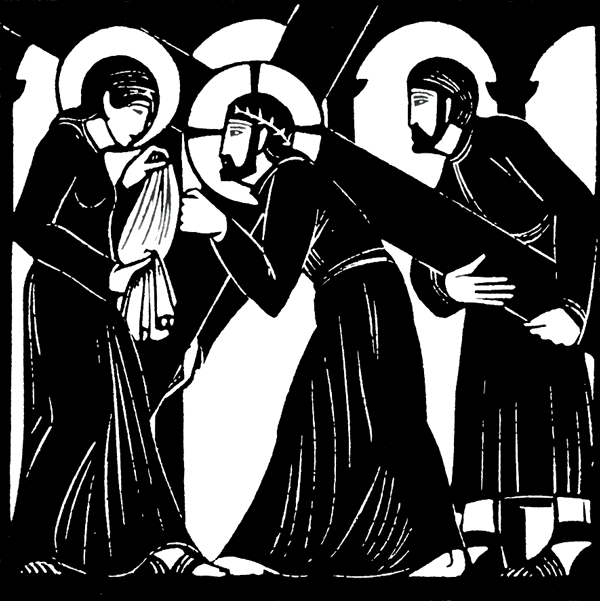
Veronica
“Everyone forgets my name now. But I was there, and I remember seeing him, carrying his cross, his face so covered in sweat and in blood from the soldiers’ blows. He stumbled towards me and almost by instinct I pulled out a small cloth and wiped his face. There was so much sweat and blood that when you looked at the cloth you could see his face. I still have that cloth, a true image of him.”
Prayer
Lord Jesus, your face was sweaty and bloodied:
be with all who care for the broken bodies of our sick and injured.
Your face was wiped by an unknown woman:
let us bear your true image in our hearts, in our words and in our deeds.
To you, Jesus, scarred by a crown of thorns,
be honour and glory with the Father and the Holy Spirit,
now and for ever.
Amen.
illustration: from a wood-engraving by Eric Gill, 1917
7 CommentsSimon helps Jesus carry the cross
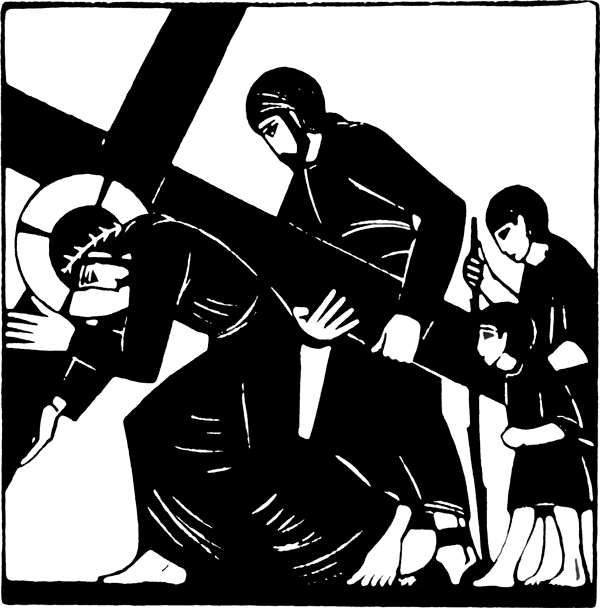
Simon
“I was there to see the Passover. It was big thing in those days, and I’d brought my two boys, Alexander and Rufus. We’d got caught up in this crowd, and I could see that they were taking some prisoners out to be executed. The soldiers saw me and the officer came over, and with his sword he forced me behind one of the prisoners and to take half the weight of the cross. I couldn’t believe how heavy it was: it seemed like I was carrying half the world. At the time, I had no idea who he was.”
Prayer
Lord Jesus, you were worn down by fatigue:
be with those from whom life drains all energy.
You needed the help of a passing stranger:
give us the humility to receive aid from others.
To you, Jesus, weighed down with exhaustion and in need of help,
be honour and glory with the Father and the Holy Spirit,
now and for ever.
Amen.
illustration: from a wood-engraving by Eric Gill, 1917
0 CommentsJesus meets his mother
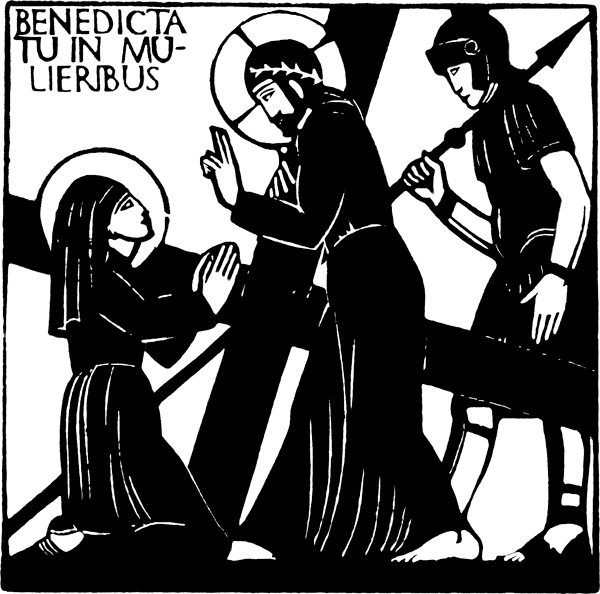
Mary
“O my son, my dear son. It was agony to see you suffering like this. How many mothers have seen their children suffer? I knew what it was like. We, my friends and I, had waited outside the governor’s palace, waiting for you to be freed. And then the soldiers forced you out, carrying a cross. Before they could stop us we ran past them and hugged you. Why was this happening to you? Why? Surely you could have said something, done something, and it would have stopped? Even now? But as he looked at me, I knew this would not happen — I felt as if a sword had pierced my heart.”
Prayer
Lord Jesus, your mother Mary wept at your torment:
give heart to all parents who watch their children suffer.
Your mother felt your pain in her heart:
guide us to bring the fullness of life to children and parents.
To you, Jesus, Son of God and Son of Mary,
be honour and glory with the Father and the Holy Spirit,
now and for ever.
Amen.
illustration: from a wood-engraving by Eric Gill, 1917
4 CommentsJesus falls the first time
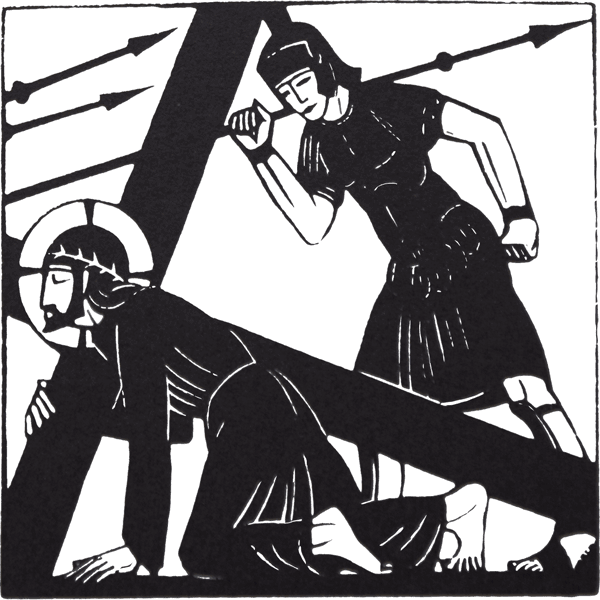
a woman
“I was standing outside the governor’s palace. It was just before Passover and a crowd had gathered to see if the governor would release any prisoners. We’d cheered the news that Barabbas was to be freed. But then the soldiers came out with some other men, taking them to be executed. They were each carrying their crosses, but this one was already weak. The weight of what he was carrying seemed crushing. He lurched towards us, and he stumbled right in front of me. The soldiers were straight in with their spears; they picked up the cross, dragged him to his feet, and carried on.”
Prayer
Lord Jesus, you suffered like us under the burdens of this world:
be with those whose strength is taken away by ill-treatment or illness.
You are present in our suffering and share our loads:
help us to let you carry our burdens.
To you, Jesus, falling under the weight of the cross,
be honour and glory with the Father and the Holy Spirit,
now and for ever.
Amen.
illustration: from a wood-engraving by Eric Gill, 1917
1 CommentJoe Cassidy
It is with much sadness that we have learned that the Revd Canon Joe Cassidy died yesterday, 28 March, after a short illness. He was 60.
Joe was a frequent commenter on this Thinking Anglicans blog, and also a valued contributor to our ‘just thinking’ series, writing challenging and pastoral pieces from a sound scholarly position. In the wider world he was the Principal of St Chad’s College, Durham, a place where many of our clergy have trained and where he will be much missed. Before joining the Church of England he had been ordained priest in the Roman Catholic Church, and was a member of the Society of Jesus, the Jesuits, in his native Canada.
The Dean of Durham, Michael Sadgrove, was his neighbour in the city, and has written this personal reminiscence.
To his wife Gillian and to his children and family we send our condolences.
May he rest in peace!
Simon, Simon and Peter
8 CommentsJesus takes up his cross
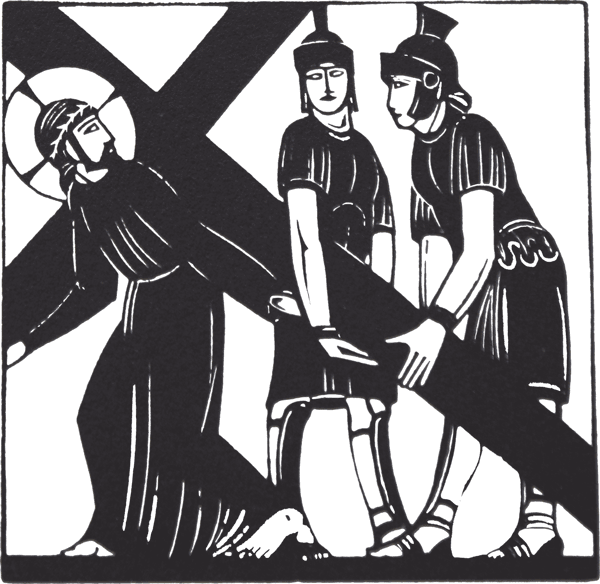
a soldier
“I was a soldier in Pilate’s guard on duty that day. Once Pilate had passed the sentence of death it was our job to carry it out. So we marched him out from Pilate round to our courtyard. That’s where we used to have our bit of fun: we dressed him up and mocked him and spat at him, and some of my mates roughed him up a bit. Then we got out a cross for him. He knew that he had to carry it, but he didn’t seem strong enough to carry that weight. But with our spears and swords, he had no choice.”
Prayer
Lord Jesus, you carried the cross through the rough streets of Jerusalem:
be with those who are loaded with burdens beyond their strength.
You bore the weight of our sins when you carried the cross:
help us to realize the extent and the cost of your love for us.
To you, Jesus, bearing a cross not your own,
be honour and glory with the Father and the Holy Spirit,
now and for ever.
Amen.
illustration: from a wood-engraving by Eric Gill, 1917
0 CommentsPilate condemns Jesus to death
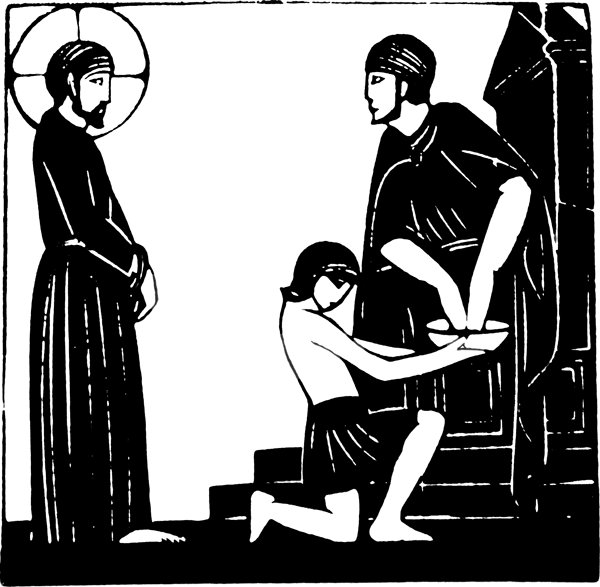
a young slave
“I was a slave in Pilate’s household in Jerusalem. There were lots of people there, jostling and pushing, and over to one side were the Jewish priests, keeping themselves separate. Pilate wanted some water and I was sent for it. I brought in a bowl and a towel and he dipped his hands in the bowl and dried them on the towel. That’s what I remember. Then Pilate said, ‘Take him away and crucify him!’ Only then did I see him — standing, shackled in front of Pilate. I wondered what he had done.”
Prayer
Lord Jesus, you were condemned to death for political expediency:
be with those who are imprisoned for the convenience of the powerful.
You were the victim of unbridled injustice:
change the minds and motivations of oppressors and exploiters
to your way of peace.
To you, Jesus, innocent though condemned,
be honour and glory with the Father and the Holy Spirit,
now and for ever.
Amen.
illustration: from a wood-engraving by Eric Gill, 1917
6 CommentsBishop of Gloucester
Updated
10 Downing Street has announced that the next Bishop of Gloucester is to be the Venerable Rachel Treweek, currently Archdeacon of Hackney.
Diocese of Gloucester: Venerable Rachel Treweek
The Queen has approved the nomination of the Venerable Rachel Treweek, BA, BTh, Archdeacon of Hackney, for election as Bishop of Gloucester in succession to the Right Reverend Michael Francis Perham, MA, whose resignation took effect on the 21 November 2014.
Notes for editors
The Venerable Rachel Treweek (nee Montgomery) aged 52, studied at Reading University and trained for the ordained ministry at Wycliffe Hall, Oxford. She served her first curacy at Saint George and All Saints, Tufnell Park in the Diocese of London from 1994 to 1997 and was Associate Vicar from 1997 to 1999.
From 1999 to 2006 she was Vicar at Saint James the Less, Bethnal Green and Continuing Ministerial Education Officer for the Stepney Episcopal Area. From 2006 to 2011 she was Archdeacon of Northolt in the Diocese of London. Since 2011 she has been Archdeacon of Hackney. In 2013 she was elected as Participant Observer in the House of Bishops for the South East Region.
Rachel is married to Guy, Priest-in-Charge of two parishes in the City of London.
Her interests include conflict transformation, walking and canoeing.
Gloucester diocese has a page welcoming the new bishop-designate including the following quote
Following the announcement, Rachel said:
“It is an immense joy and privilege to be appointed as the Bishop of Gloucester. I am surprised and, I have to admit, even a little daunted by the prospect, but my overwhelming feeling is one of excitement to be coming to join with others in sharing the love of Jesus Christ with the people of this diocese.
“I am looking forward to encouraging Christians to speak out with confidence about their faith and the good news that the Gospel brings. It will be my privilege to work with churches as we connect with people, wherever they are and whatever their concerns.
“My calling to the role of bishop has been shaped by human encounter. I believe profoundly that relationship is at the heart of who God is. I have been with people through the joys and pains of their lives and it is these experiences that I will reflect upon as I take up this new role.”
The diocese of London also covers the appointment of one of its archdeacons. The Bishop of London, Richard Chartres, is quoted:
As Richard of Gloucester is reinterred, Rachel of Gloucester is revealed. Rachel has served her entire ministry in the Diocese of London, excelling wherever she has been. She has twice acted as Archdeacon, in Northolt and then Hackney — two highly demanding and contrasting areas where she has shone in equal measure.
… While we are very sorry to see her go, Gloucester has appointed someone with real quality and distinction. We look forward to continuing to support her in the years to come.
There is also coverage in the press including
several of which note that she is expected to become the first woman bishop to sit in the House of Lords.
31 CommentsAmending Canon No 33
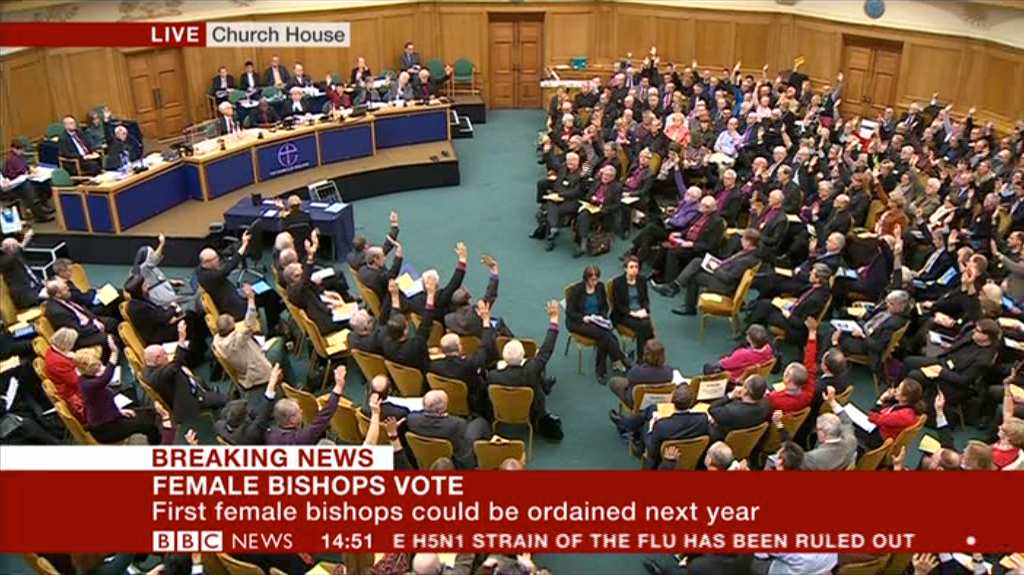
The General Synod of the Church of England has today, by clear show of hands, passed a motion enacting Amending Canon No 33. The effect of the amendment is to enact that:
4 CommentsA man or a woman may be consecrated to the office of Bishop.
suffragan Bishop of Burnley
Updated
It has been announced from 10 Downing Street this morning that the Revd Philip North is to be the next Bishop of Burnley in the diocese of Blackburn:
The Queen has approved the nomination of the Reverend Philip John North, MA, Team Rector of the Parish of Old Saint Pancras, in the Diocese of London, to the Suffragan See of Burnley, in the Diocese of Blackburn, in succession to the Right Reverend John William Goddard, BA, on his resignation on 31 August 2014.
A press release from Forwad in Faith comments:
Forward in Faith is delighted at the news that Fr Philip North is to be the next Bishop of Burnley, in succession to Bishop John Goddard.
Fr North is well known for his pastoral gifts, his zeal for mission and evangelization, and his commitment to the proclamation of the Gospel, especially amongst the poor.
We are proud to welcome a new episcopal member of Forward in Faith, and we pray for Fr North as he prepares for his move, and for the whole people of God in the Diocese of Blackburn.
Update (Friday afternoon)
Blackburn diocese is now also carrying this news: next Bishop of Burnley to be the Reverend Philip North and quoting the bishop-designate:
“Some of you might be aware that I withdrew from an appointment as Bishop of Whitby. The fact that I have been invited and have agreed to serve as a Bishop again is testimony to the very different mood across the Church of England since the understandable disappointment that followed the failure in 2012 of the legislation to enable women to be bishops.
“The Church has stated afresh its commitment to enabling all traditions to flourish within its life and structures, and I hope that my appointment will be seen as evidence of that pledge.”
And the Bishop of Blackburn, Julian Henderson, is quoted:
83 Comments“I want to make it clear that I see Philip’s appointment as a clear sign the Anglican Church in Lancashire is living out these five guiding principles.
“I wanted to have an episcopal colleague who is from the traditionalist catholic constituency and Philip fulfils that role well. He comes to serve the whole Diocese. He will also have particular care for those people who cannot accept the ministry of women as Bishops and Priests in the Church — and he will have my wholehearted support in carrying out this important work.”
Bishop of Gloucester
The investigation into allegations against the Rt Revd Michael Perham, Bishop of Gloucester, has been dropped.
BBC News reports that The Bishop of Gloucester is to face no further action by police over two allegations of indecent assault.
The Gloucestershire Citizen also carries the story here with slightly more detail:
A statement from Bishop of Durham, Rt Revd Paul Butler, Lead Bishop on Safeguarding for the Church of England said: “We can confirm that we have been notified by the Metropolitan Police that following enquiries they are to take no further action regarding the allegations made against the Rt Revd Michael Perham, Bishop of Gloucester.
…
“We would ask for continuing prayers for all of those affected by these events and those involved in ongoing processes.“
Bishop Michael said: “It was right that the allegations should be fully investigated and I am gratified that the police have completed the investigation and concluded that there are no grounds for further action to be taken
“My family and I are profoundly grateful for all the support and affirmation we have received through this very difficult time.”
Bishop Michael will not yet return to his post until due church processes have been concluded.
However he hopes the process will conclude in time for him to return to his post before he is due to retire as planned in November. https://australiacasinoonline.com/5-dollars-minimum-deposit-casinos-australia/
We earlier reported the news that Bishop Michael was ‘stepping back’ from his role in the diocese of Gloucester, pending his retirement in November.
7 Comments